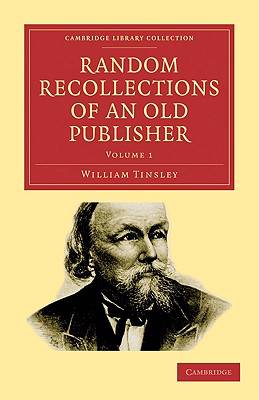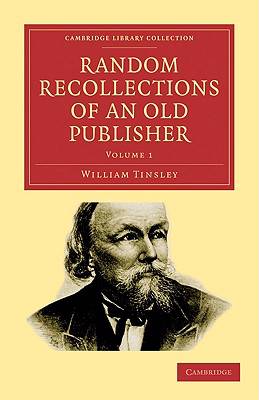
Door een staking bij bpost kan je online bestelling op dit moment iets langer onderweg zijn dan voorzien. Dringend iets nodig? Onze winkels ontvangen jou met open armen!
- Afhalen na 1 uur in een winkel met voorraad
- Gratis thuislevering in België vanaf € 30
- Ruim aanbod met 7 miljoen producten
Door een staking bij bpost kan je online bestelling op dit moment iets langer onderweg zijn dan voorzien. Dringend iets nodig? Onze winkels ontvangen jou met open armen!
- Afhalen na 1 uur in een winkel met voorraad
- Gratis thuislevering in België vanaf € 30
- Ruim aanbod met 7 miljoen producten
Zoeken
Random Recollections of an Old Publisher 2 Volume Paperback Set
William Tinsley
€ 71,45
+ 142 punten
Omschrijving
William Tinsley (1830-1900) was a noted Victorian publisher whose catalogue included works by such celebrated novelists as Thomas Hardy and Wilkie Collins. This two-volume autobiography, first published in 1900, traces his life from his rural childhood to the establishment and rise of the Tinsley Brothers company in 1858, and its later collapse. Each chapter is divided into a series of brief sketches of authors and other contemporaries. The book describes the personalities Tinsley encountered, and also includes observations on Victorian transport and commerce, and playwrights, actors and theatres (including Sadler's Wells). Based on Tinsley's personal recollections, and incorporating letters as well as anecdotal information, these volumes will fascinate anyone interested in the history of publishing and the development of the nineteenth-century novel.
Specificaties
Betrokkenen
- Auteur(s):
- Uitgeverij:
Inhoud
- Aantal bladzijden:
- 748
- Taal:
- Engels
- Reeks:
Eigenschappen
- Productcode (EAN):
- 9781108009218
- Verschijningsdatum:
- 4/03/2010
- Uitvoering:
- Boek
- Afmetingen:
- 140 mm x 216 mm
- Gewicht:
- 975 g

Alleen bij Standaard Boekhandel
+ 142 punten op je klantenkaart van Standaard Boekhandel
Beoordelingen
We publiceren alleen reviews die voldoen aan de voorwaarden voor reviews. Bekijk onze voorwaarden voor reviews.











